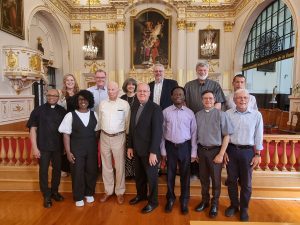QUEBEC, CANADA – The fifth session of the seventh phase of the Catholic-Pentecostal International Dialogue took place at the Monastere des Augustines, Quebec City, Quebec, Canada, from July 11-17, 2025.
The Vatican’s Dicastery for Promoting Christian Unity and the Pentecostal World Fellowship’s Christian Unity Commission co-sponsor this Dialogue.
During this session the participants continued their work on the theme, Lex Orandi, Lex Credendi (the law of prayer is the law of faith).

The goal of the Dialogue, started in 1972, is to promote mutual respect and understanding in matters of faith and practice.
The group started to prepare the Final Draft of the current phase which includes among its topics: kerygma/proclamation and Christian faith; prayer/worship and Christian life; as well as sacramentality and Christian living.
The report will be finalized and presented to the respective constituencies by 2026.
Meeting in Quebec City gave the opportunity for participants to become acquainted with the Pentecostal Assemblies of Canada.
Participants acknowledged with gratitude the assistance provided by Rev. Gary and Gwen Connors as local hosts.
Particularly significant was the Sunday worship and visit at a local Francophone PAOC congregation, Le Carrefour Chrétien de la Capitale, led by Rev. Jean-Frederic Laroche, as well as worship facilitated by the Pentecostal team at the Chapel of the Monastère des Augustines.
The participants also engaged in a meaningful learning experience as they were exposed to the history and faithful ministry of the L’Ordre des Augustines du Miséricorde de Jesus in Quebec.
During the meeting, entirely devoted to the Final Report, the participants were informed about the participation of Rev. David Wells and Rev. Opoku Onyinah at the inauguration of the ministry of Pope Leo XIV. Morning and evening prayers each day were led alternately by Catholics and Pentecostals.
Co-Chairs of the Dialogue were the Most Rev. Joseph C. Bambera, Bishop of Scranton, and Rev. Cecil M. Robeck, Jr, Senior Professor of Church History and Ecumenics, Fuller Theological Seminary, Pasadena, California, USA (Assemblies of God).
They were assisted by Rev. David Wells, Chair of the PWF CUC, as well as by Rev. Prof. David Cole, Liaison to the Greater Christian Community for the Pentecostal/Charismatic Churches of North America, and by Msgr. Juan Usma Gómez, DPCU, who served as co-secretaries.
Regarding this year’s session, Bishop Bambera said, “Our time in Quebec City has afforded us the opportunity to experience the fruits of the tenant of faith upon which we’ve reflected the past seven years: Lex Orandi, Lex Credendi – As we worship, so we believe! From our experience of a vibrant Pentecostal community to the very halls where we lived and worked in the Monastere des Augustines, whose founders established the first hospital in North America in 1639, we have been blessed to witness the fruits of discipleship lived in and through a deep respect and reverence for our brothers and sisters in Christ. Reflecting the heart of the work of Christian unity, Pope Leo XIV, shared these words on the day following his inaugural Mass with representatives of other churches and ecclesial communities. Recalling his episcopal motto, ‘In the One – that is Christ – we are one,’ Pope Leo encouraged us “to pray and work together to reach this goal, step by step, which is and remains the work of the Holy Spirit.”
Rev. Robeck also noted, “Prayer is important to all of us. It is a primary means that we use to communicate with God. Are our prayers essentially self-centered or do they move us to greater love for God and for our neighbor? How we pray holds implications for how we face life, especially life in community. This Dialogue has helped us to see such questions more clearly as together, we express our desire for greater unity.”
